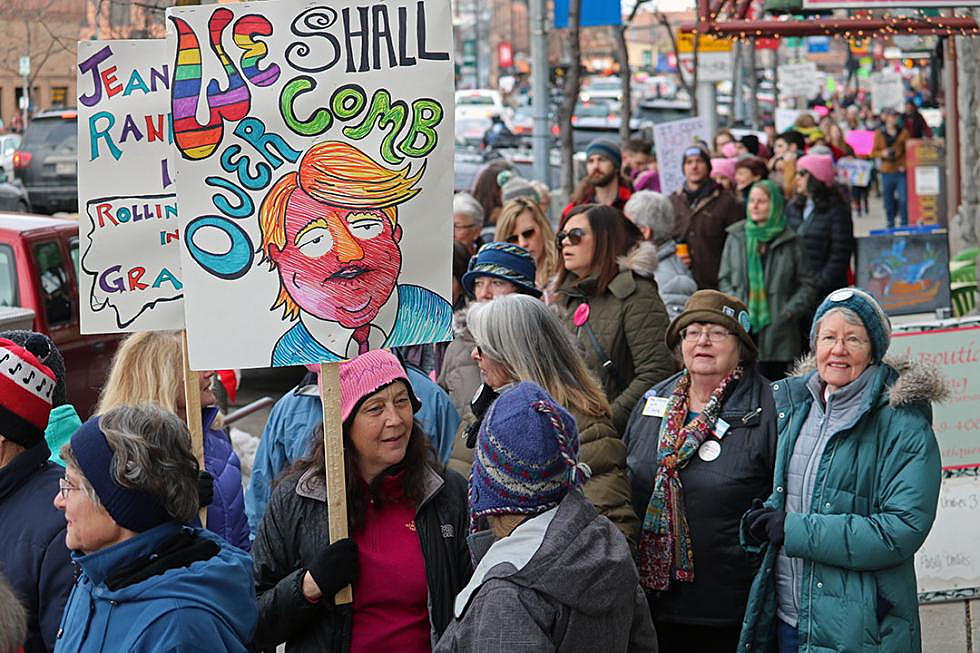
Women launch #metoomontana, urge state delegation to hold Trump accountable
A coalition of women launched the #metoomontana movement on Saturday by calling on the state's congressional delegation to condemn President Donald Trump for what activists described as his history of sexual assault and harassment of women.
In launching their campaign, members of the Montana effort allied themselves with the national #metoo movement and pushed for reforms at both the state and federal level, including greater protection for indigenous women and stronger hate crime laws to cover violence based on sexual orientation and gender identity.
They also opened a #metoomontana Facebook page to enable women to share their stories.
“We've been moved by the national #metoo movement that has moved swiftly throughout the United States,” said Rebecca Weston. “This movement has shed light on what so many of us already know in the intimate parts of our own lives – that sexual assault and harassment takes place every day and everywhere to nearly every woman.”
Launching the movement coincided with the first anniversary of the national Women's March, including events planned Saturday across Montana. While the state movement was billed as a nonpartisan call for justice, the #metoomontana coalition took strong aim at Trump and state Republicans.
Among them, Weston called out Montana Senate President Scott Sales for allegedly “shaming” female legislators who may not feet safe coming forward to report sexual harassment. Earlier this month, Sales suggested that the heightened visibility around sexual harassment would see the issue “solve itself” in the Legislature.
“Recently, Senate President Scott Sales shamed women legislators who may not feel safe coming forward,” said Weston. “In response to Senator Sales, women around Montana will address not only the many ways they have been coming forward, but that they're often not believed, lack follow-up investigation, or are unable to achieve safety due to severely compromised financial circumstances.”
Saturday's unveiling of #metoomontana included a list of transgender and indigenous women who shared stories of discrimination, harassment and assault.
Among them, Amelia Danielle Marquez, a transgender woman from Billings, said she's faced all forms of sexual harassment and other forms of gender bias.
“Throughout my life and across the state, I've faced all forms of discrimination,” said Marquez. “I truly believe I have lost opportunity because businesses believe I won't fit into their workplace or might cause disruption.”
Marquez believes Montana lacks basic laws to protect those who face various forms of violence. Other than a nondiscrimination bill that was killed by the 2017 Legislature, not a single measure was brought forward to protect transgender individuals from violence and discrimination, she said.
Anita Green, a transgender woman from Missoula, offered similar sentiments while calling on Montana's congressional delegation to hold Trump accountable for his past actions.
“I'm calling on Montana's members of Congress to publicly call out Donald Trump for the misogynistic and deplorable things he has said regarding women, and for his promotion of sexual assault,” said Green. “This isn't about party lines. It's about demonstrating that we as a country and human beings won't tolerate the kind of behavior or language promoting sexual assault.”
Green, who served as Montana's first openly transgender national delegate to a nominating convention, said she was tokenized due to her transgender status. She added that transgender individuals are more likely to be the target of hate crimes.
“I'm calling on our legislators, both on a state level and on a federal level, to help pass laws to make it a hate crime to discriminate or attack people on the basis of their perceived sexual orientation, gender identity or gender expression,” Green said. “It's imperative we create a national registry of hate crimes for the (LGBTQ) so people of the U.S. can better understand the severity of crimes against (LGBTQ).”
The #metoomontana movement also gained the support of several indigenous women, including Ivy McDonald, a gay Blackfeet tribal member, and Kathy Littleleaf, also a member of the Blackfeet Tribe.
Littleleaf said the #metoo movement affects her on an individual, family, community and national level.
“It affects all areas of my life,” she said. “Here today we acknowledge the misogynistic attitude toward women, the prejudice against women, and living in a culture with a misogynistic attitude that has enabled sexual misconduct to go unchecked.”
Littleleaf cited statistics suggesting that roughly 33 percent of indigenous women will be the victim of rape. She also said indigenous women are dealing with colonialism and violence, neither of which have disappeared.
She also joined the others in asking Sens. Steve Daines and Jon Tester, and Rep. Greg Gianforte to hold Trump accountable for his wrongdoings.
“As an indigenous woman, it's not just the sexist views of this president that we're dealing with,” she said. “We're also dealing with his racism too, racism we have been dealing with since colonialism.”
